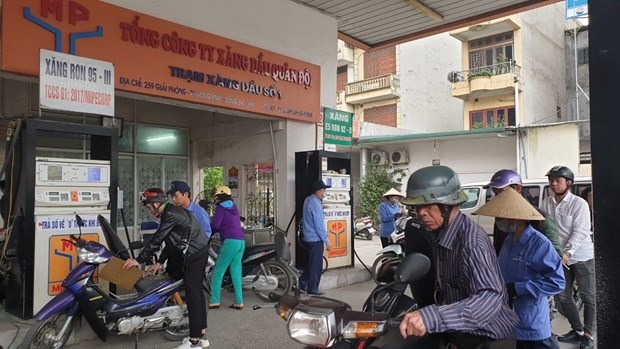The retail prices of oil and petrol rose sharply on Tuesday following adjustments made by the ministries of finance and industry and trade.

The retail prices of oil and petrol rose sharply on Tuesday following adjustments made by the ministries of finance and industry and trade.
The two ministries review fuel prices every 15 days to keep domestic prices up to date with the global market. The retail price of bio-fuel E5 RON 92 has been raised to a maximum of VND18,588 (US$0.8) per litre, up VND1,377, and that of RON 95 no more than VND20,033 ($0.86), up VND1,484.
The ceiling prices of diesel and kerosene went up by VND1,219 and VND1,086 to VND17,087 and VND15,971 per litre, respectively. The price of mazut was capped at VND15,210 per kilo, up VND1,127.
The price of ethanol E100, which is used to calculate the price of E5 RON 92 after the elimination of petrol RON 92, stood at VND14,725 per litre without VAT.
According to the ministries, in the 15 days before April 2, the global price of RON 92, which is used to produce biofuel E5, averaged $75 per barrel. Prices of RON95 were $76.43 per barrel, increasing 4 to 5 per cent from the previous period.
The two ministries decided to keep the use of subsidies from the petrol price stabilisation fund unchanged.
Accordingly, subsidies for E5 RON 92 remain at VND2,042 while those for RON 95 are VND1,304 per litre. The subsidies for diesel and mazut remain at zero.
This is the second time this year petrol prices have been raised.
Earlier, petrol wholesalers said they were suffering losses of VND300-500 per litre due to the hike in global prices, prompting the fund to kick in.
In a price review on March 18, the two ministries decided to keep retail prices unchanged despite a surge in global prices. They instead decided to increase subsidies from the stabilisation fund based on the amount of petrol they imported or sold, causing many distributors to say they were in debt, so they had to use company capital or bank loans to make up the difference.
The General Statistics Office (GSO) at a meeting last week said the petrol price adjustment was flexible and had not had a major impact on business activities.
GSO director Nguyen Bich Lam said they had recommended not raising petrol prices in parallel with power tariffs in March to avoid causing public concern.
The idea was to avoid inflation and reassure the people. Even if gasoline prices increase, March CPI will fall from 0.1 to 0.2 per cent,” Lam said.
The balance of the petrol price stabilisation fund at Viet Nam National Petroleum Group (Petrolimex) was VND9.6 billion as of Tuesday, the group said.
The balance has fallen sharply by VND645 million from the previous adjustment two weeks ago. — VNS




